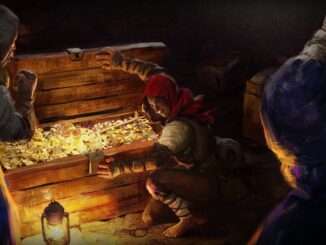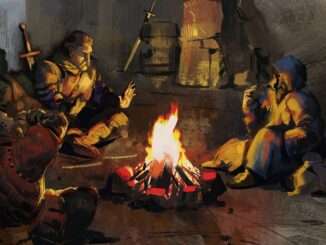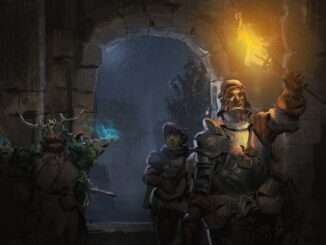
Build Guide for Bard (How to Play)
By Ymoriart.
What is the Role of the Bard ?
The bard is above all a support. He draws his strength from the sounds he plays with his lute, in order to boost his allies, or turn the tide of a fight to his advantage.
He can also be played solo, with certain perks increasing his damage, even if the main vocation is to support his team.
The Bard’s Spells and Stats
To start, here are the stats of a basic bard:
- Strength: 12
- Agility: 16
- Will: 10
- Knowledge: 17
- Resourcefulness: 20
- HP: 94
Bard’s Perks
| Lore Mastery | Increases interaction speed by 25% |
| Melodic Protection | Increases physical armor by 15% while music is playing |
| Rapier Mastery | Increases weapon damage by 3 and action speed by 5% while holding a rapier |
| Wanderer’s Luck | Increases the chances of finding better loot qualities in chests |
| War song | Grants 3 attack power for 6 seconds to allies when a melody is played |
Bard’s Skills
| Dissonance | Silences anyone near the bard for 3 seconds. |
| Encore | Automatically and perfectly plays the next sound |
| Music Memory | Allows you to store 4 pieces of music |
| Music Memory 2 | Allows you to store 4 pieces of music |
Music Currently Available
| Accelerando | Gradually increases movement speed of allies for 8 seconds based on performance (Bad: 5 per second, Good: 10 per second, Perfect: 15 per second) |
| Chaotic Discоrd | Causes enemy AI units to attack the nearest target (Including monsters themselves) |
| Peacemaking | Any player or AI around the bard cannot physically attack for 8 seconds. |
| Tranquility | Regenerate allies’ wound bar based on performance (Bad: 8hp for 4 seconds, Good: 16 hp for 8 seconds, Perfect: 24 hp for 12 seconds) |
Stats and Spells to Favor on The Bard
The Bard is a class that lacks speed, and even more so when music is played, the Bard’s speed is reduced. One of the most important stats is agility and move speed. Agility allows you to increase your dps by increasing your attack speed.
Strength is also an important characteristic of the character, it allows you to give damage but also HP.
Will and knowledge do nothing for the bard. The only stat that could impact the bard is buff duration. But it is better to take this pure stats not via Knowledge or Will..
Resourcefulness is important to open doors and chests faster, which can save you from a lot of trouble. Thanks to the Lore mastery perk, we already gain 25% of interaction speed, we just need to go up to 27% of resourcefulness to reach the 80% mark, we don’t need to go above (Resourcefulness being cap at 80%).
Summary of Stats to Prioritize
- Agility: Attack speed & move speed
- Strength: Damage & HP
- Resourcefulness: Up to 80% interaction speed
For spells, I recommend taking Dissonance, as well as a music memory, otherwise it would be impossible to play music.
Why Choose Dissonance Over Encore?
Encore lets you play music automatically without worrying about pressing it at the right time, it looks good on paper. However, the bard relies heavily on quick casting (intentionally missing musical notes to speed up the music casting) for very long sounds like chaotic discоrd and peacemaking. In doing so, it can therefore be used for only two pieces of music, which are already very quick to perform.
On the other hand, Dissonance allows you to silence wizards and clerics while being close to melee, which prevents the opposing team from healing, or benefiting from a third magic dps. It also makes it possible to prevent all skills of a barbarian entering a fight, or of a fighter to move faster or heal for example.
Dissonance can therefore be a big asset and make you win a fight on its own, by cutting off your opponents’ skills for three seconds. It is a very powerful tool to use well with good positioning, since your allies are also impacted by the skill.
For perks, I recommend taking Wanderer’s luck (which allows you to make much more gold and find much better equipment), as well as Lore mastery (You avoid having to spend too many stats on Resourcefulness).
I then recommend going on Rapier mastery, in order to gain damage and combat speed so that you can take care of PVE as well as PVP more easily
Then on War song, which adds a lot of damage to you and your team with each melody played.
The Different Ways to Play
The Bard is one of a kind, and features two branches of equally unique gameplay
You can very well be a support but also a class with quite high physical damage.
Play as a Support
Unlike a cleric, your concern will be to keep your team under constant speed boost. The speed boost being the strong point of the class, allowing your team to chase opponents, to dodge blows more easily, but also to flee, must be applied at all times.
In addition to Accelerando, you will also have to take care to apply your tranquility during each fight, the heal of tranquility not being that of a cleric, it nevertheless allows you to sustain damage taken from each blow of your opponent during the fight . It’s a very powerful tool that only needs to be cast once or twice per fight because the fight lasts a long time. And it may be the 30 HP you will regenerate on your allies during the fight that will win you this one.
But you must not forget to play either, if you have the opportunity to kick your opponent, to help your team, between two sound casts, it is essential to do so to win the victory.
Play Offensively
The second way to play is harder than the first, since your power lies in your speed to perform several actions very quickly, between picking up your lute, playing your sounds, picking up your rapier, and repeating the process until you win the fight.
The key to winning a fight with a bard is to play with the war song and a rapier, to maximize your damage.
After several tests, your damage can go up to 64 per hit with a blue rapier, war song and rapier mastery, WITHOUT any damage stuff (I haven’t tried to apply a stuff to myself in the optics of really only do damage). Which means you could go even further.
(The test was carried out with a stull full resourcefulness)
Also, don’t forget that you have 5% action speed on your rapier, and therefore a slightly faster attack speed than another person (the rapier is already a very fast weapon and with a good reach), it also help to reload your hand crossbow faster while having a rapier in the other hand.
The Perfect Composition for a Bard
To have an effective bard, you need a composition that follows and can hold the frontline, especially if you play support.
To have the maximum impact in support, it is preferable to have a solid team that can take the blows. Remember that Tranquility only restores part of the hit points (Injury Bar).
It is therefore preferable to team up with classes with high health, as this will increase the usefulness of your heal and your sustain.
For this, I recommend a team as follows:
Barbarian/fighter – Barbarian/fighter – Bard
The composition is simple, the barbarian and the fighter will benefit a lot from your speed and heal sounds. You will heal more in combat, and they will be able to chase anyone and catch up to them. They will also be able to engage much faster, and prevent runaways with the given movement speed.
It is also possible to play a composition centered on one person, with two supports behind:
Barbarian/fighter – Wizard/cleric – Bard
This way, your wizard or cleric can buff your frontline, with speed, invisibility or shield and stat buffs. The wizard’s haste buffs are added to those of your Accelerando, which drastically increases the speed of your frontline. However, this kind of composition requires very good players and a lot of communication, and team play. It’s also a great composition that provides a lot of tankiness, and your move speed will be beneficial, since tank comp has a lack of move speed. This composition has nevertheless proven itself for me with a fighter, who could flank his opponents far too quickly for them to have time to realize what is happening. Take a kill, reposition just as quickly.
There is also a third composition, with a much more original way of playing than the other two:
Wizard – Wizard/cleric – Bard
The composition may surprise you, no frontline, so it will be easy to kill you quickly by running into it!
But remember your “Peacemaking” sound, which allows you to avoid all physical attacks in an area. Spells are not affected by this melody, and your wizards or clerics can continue to cast and kill your opponents for the duration of the sound.
All you have to do this time is to constantly cast your Peacemaking, to ensure that no one approaches your team mates, you then give them the opportunity to have a totally free dps on all melee (And put away, if you position yourself well). This technique is extremely strong, however you have a 2 second beat (with a quick cast of your sounds) where enemies can tap.
If you wish to avoid this, you can remove a cleric/wizard and replace him with a bard. You can then chain Peacemaking without any beat, and cast your other sounds at the same time.
Now that we’ve established the best comps, you’ll notice I didn’t mention rogue or ranger.
The rogue is a class with a particular kit, which allows you to play in a more solitary way than the others. The speed of a rogue is too high and you risk having to run constantly behind him to put your AOE of heal or speed on him. In addition, the duration of the buffs on the rogue is reduced, and it will therefore be more difficult for you to keep your boosts permanently on him.
It’s also a class that prefers to be behind enemy lines, to kill the more squishy classes, where you can’t follow and assist it.
To put it away is also a problem, you have a distance, which plays next to you, but does physical damage. You will therefore not be able to use your peacemaking if someone is rushing you, at the risk of preventing them from playing completely. Which can quickly become fatal for you.
Of course, it is quite possible to play with its classes (I myself have done it several times and everything went well), but it is still harder to make the team work with it.
Update on the Quick Cast
To begin, we must answer the following question, what is the quick cast?
The quick cast is a technique which deliberately consists in not performing all the notes perfectly (therefore missing certain notes) in order to accelerate the casting of a melody.
But the quickcast can then take two different forms, first, it can become mandatory for certain music. Chaotic discоrd as well as Peacemaking are not impacted by the quality of a sound played, and the purpose remains the same. So there is no point in not quick casting his two songs.
The depth of this gameplay lies in the last two sounds Accelerando as well as Tranquility.
Why would you tell me?
First, performing a quick cast will have effects on your music, Accelerando will make you go much slower and Tranquility will heal you less.
But what is the point of quick casts if they only give us disadvantages?
Well when you play music you get slowed down so take the aspect of you get chased you have to go fast you can play Accelerando in quick cast to give you a slight but not insignificant speed boost and run away.
You can do the same with your Tranquility, to heal yourself slightly, which can still give you an advantage.
But remember your “War song” damage perk, which gives you bonus damage with each sound played. It is therefore faster to refresh with a quickcast your War song and to return to the fight if you play in a more offensive way.
Here is one of the fastest ways to quick cast Accelerando or Tranquility, you hit the first notes, and miss the last.

But there is even faster than this, to save as much time as possible, the time between the second note and the third is shorter, however the timing is more complicated to have

Useful Tips and Tricks
- The bard can carry a hand crossbow in addition to his rapier, it can be useful if you orient your bard towards a combat class rather than support. However, the one-handed crossbow slows you down when moving.
- It is possible to perform a “quick cast” on the Chaotic Discоrd song, missing the first 3 notes. You will then have to make a perfect on all the other notes to start the music. Be careful, if you miss other notes, the music will not start. The quick cast will save you precious seconds.
- It is possible to “quick cast” the “Peacemaking” song, missing the first two notes. You will then absolutely have to make a perfect on the other two notes to start the music. Be careful, if you miss other notes, the music will not start. The quick cast will save you precious seconds
- It is possible to “quick cast” the “Tranquility” song, by only making two good notes, that will go on 18 hp recovery.
- It is possible to “quick cast” the “Accelerando ” song, by only making two good notes, that will go on the full duration and speed.
- A mage or a cleric can both cast spells during the duration of Peacemaking, so this can be a very powerful tool for controlling enemy melee while still leaving your mage an open door to kill them without fear of getting run over. .
- Dissonance can silence Skeleton Mages, making it much easier to kill them without taking a spell
- Dissonance only affects targets in a very short range, so you need to get close enough to your opponents for Silences.
- Dissonance can cut off the current cast of a wizard or cleric. Very useful for controlling mages and preventing them from completing their spells.
- It is possible to make all the rooms of a dungeon / hell alone thanks to chaotic discоrd, there will only be one mob left to complete each time
- Chaotic discоrd does not work on semi-elite (Wraith, skeleton champion) or bosses (Lich & ghost king)
- However, Peacemaking works perfectly on any type of mob, which makes semi-elite very easy to kill.
- When using the Crossbow, once you shoot you can quickly unequip the crossbow to gain move speed.





Be the first to comment